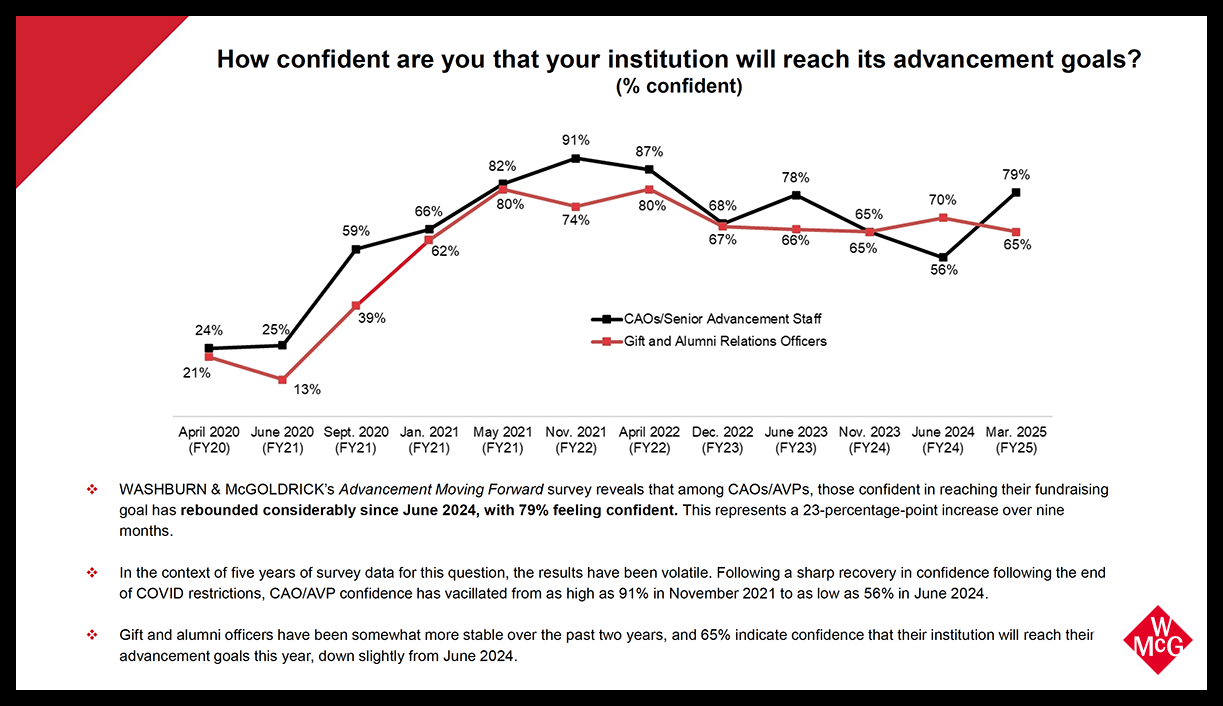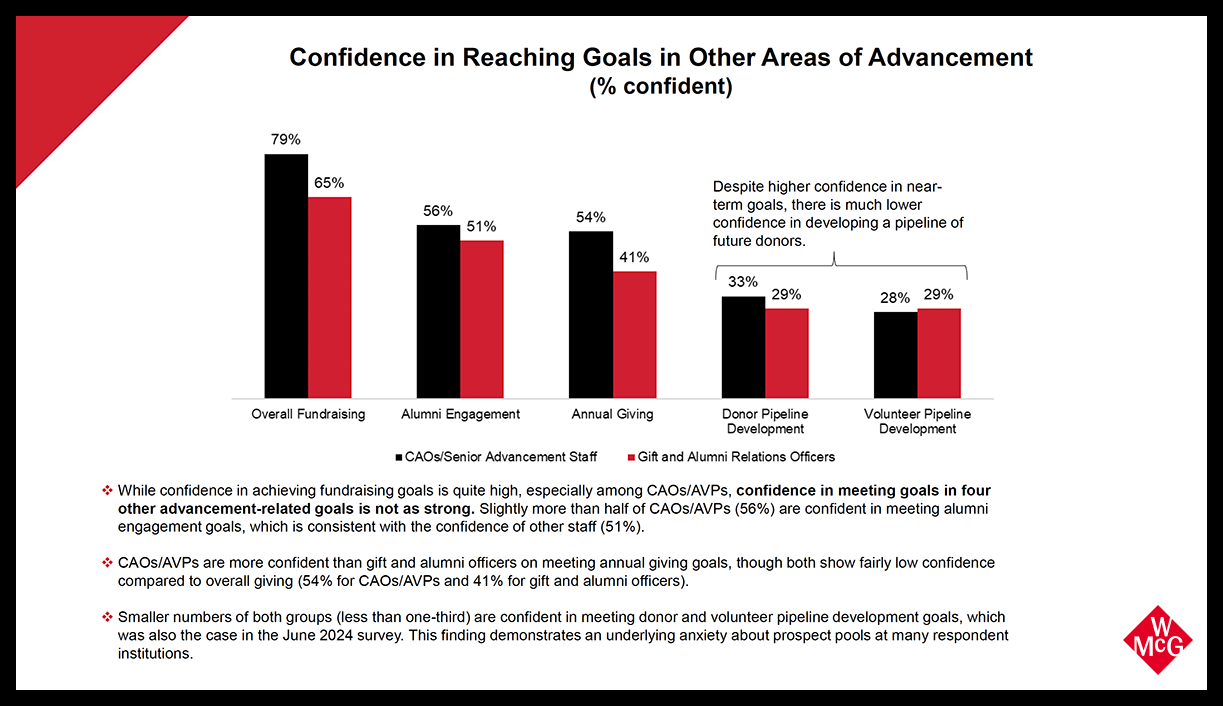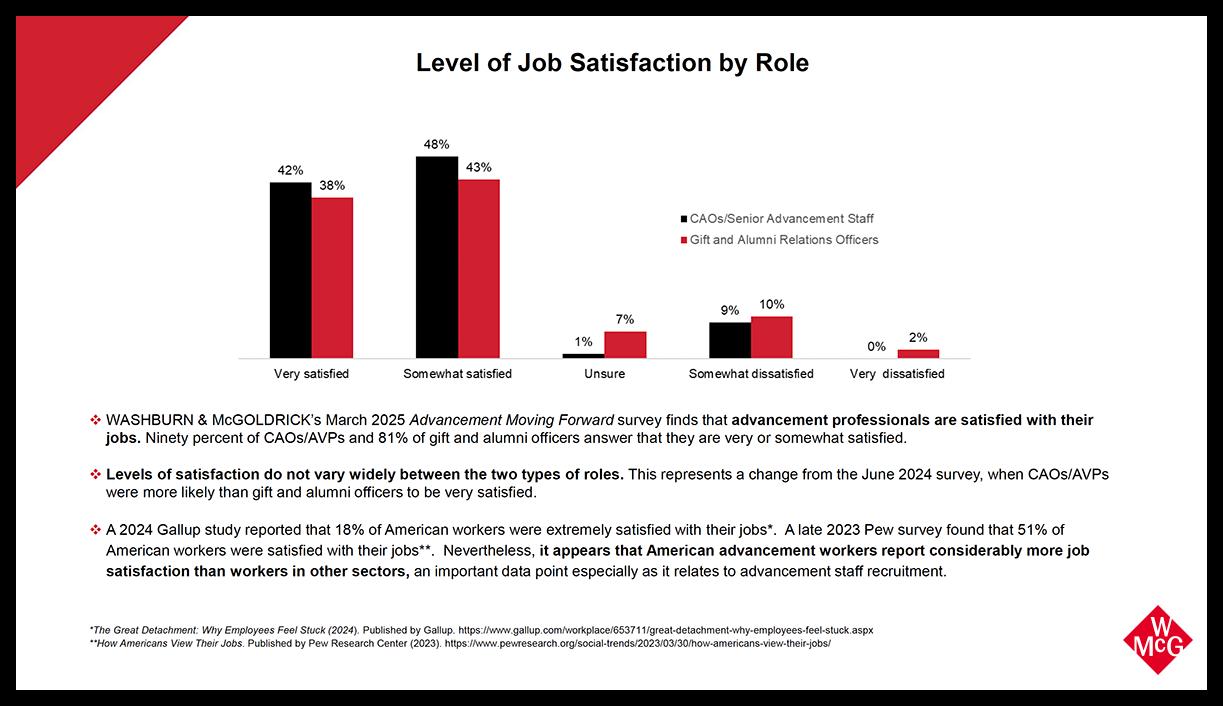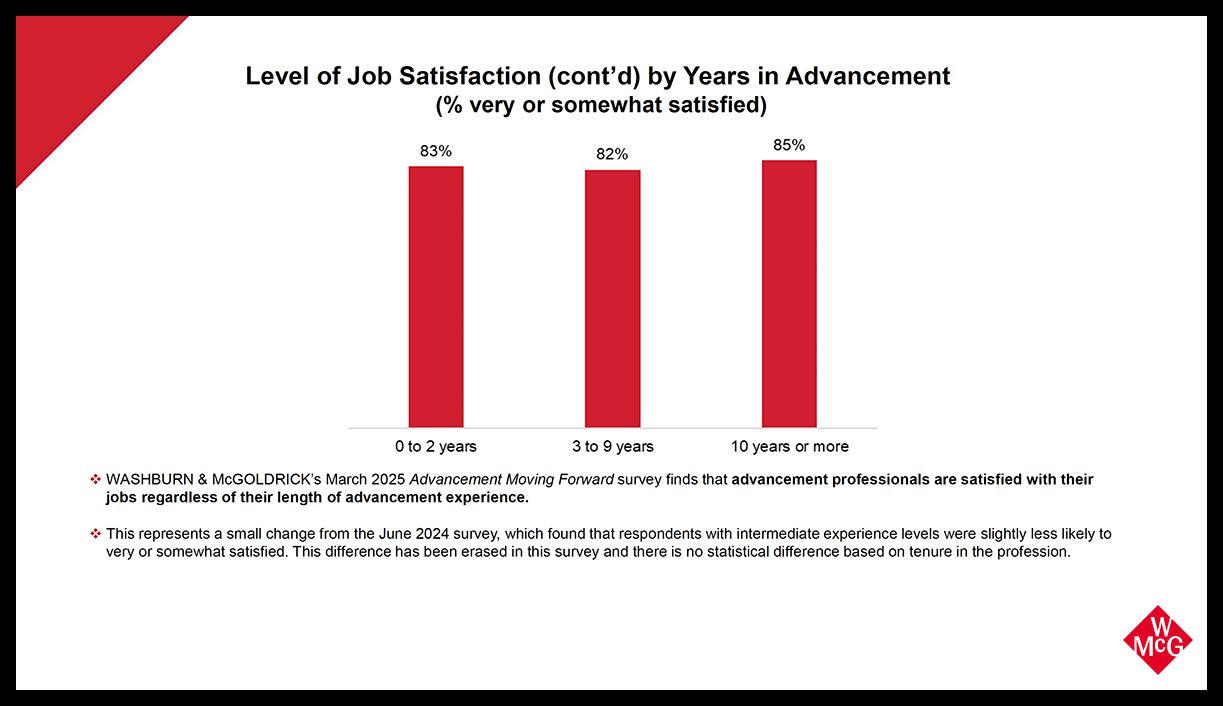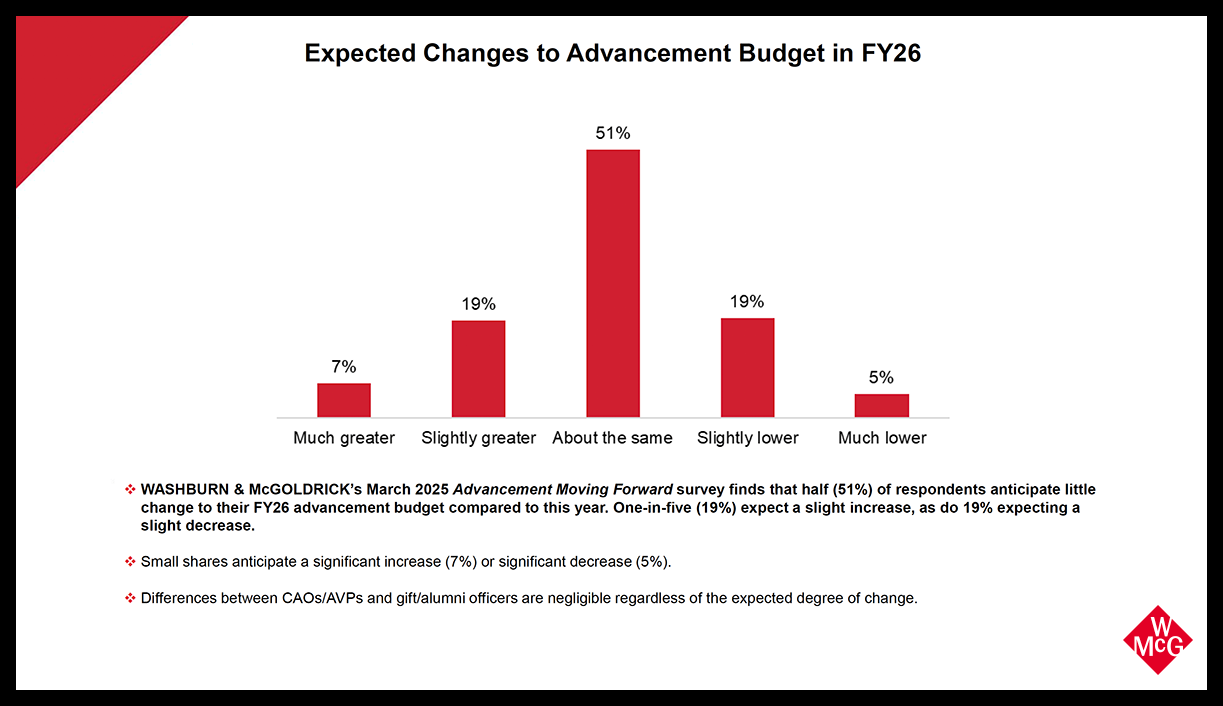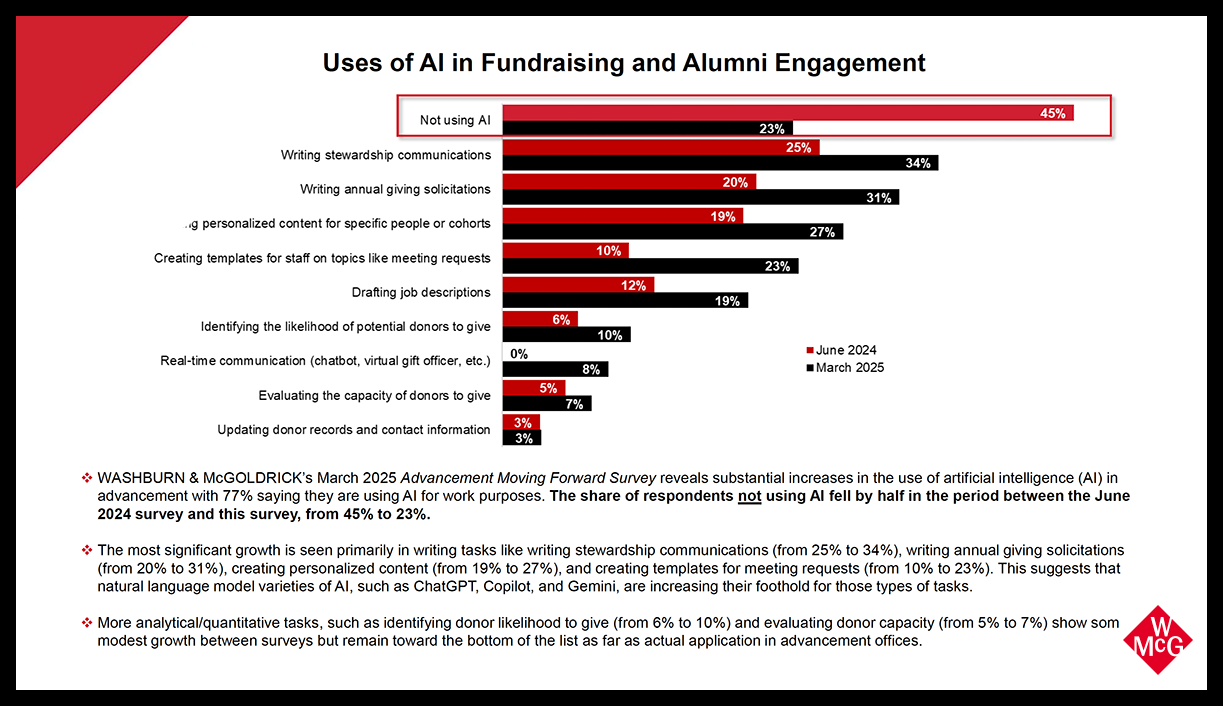Survey Finds Rebound in Confidence Among Senior Advancement Leaders in their Ability to Achieve Financial Goals
March 2025 Survey of Advancement Professionals
The Washburn McGoldrick March 2025 survey of advancement professionals is the twelfth in our Advancement Moving Forward series. The previous eleven surveys in this series were conducted in April 2020, June 2020, September 2020, January 2021, May 2021, November 2021, April 2022, December 2022, June 2023, November 2023 and June 2024. Details about the methodology and participating institutions are found at the end of this report.
As the nation’s colleges prepare to complete their academic year with many universities facing an array of external challenges, a new survey finds that despite potential obstacles, there has been a rebound among most of these institutions’ senior advancement leaders in their confidence to achieve their financial goals for the year.
According to the survey, a majority (79%) of these senior leaders (CAOs/AVPs) believe they will reach their goals, representing a 23% increase since this survey was conducted in June of 2024. In fact, the survey reveals that this level of confidence among senior level advancement leaders (CAOs/AVPs) is at a level not seen since June 2023.
The Advancement Moving Forward survey is the twelfth in a series, conducted by Washburn McGoldrick, one of the nation’s leading educational and institutional advancement consulting firms, finds that while senior advancement staff are confident about current outcomes (giving and engagement) they remain significantly less confident about building toward the future with donor and volunteer pipelines.
The survey also finds that the majority of advancement professionals are satisfied with their jobs. Ninety percent of CAOs/AVPs and 81% of gift and alumni officers answer that they are very or somewhat satisfied. Levels of satisfaction do not vary widely between the two types of roles. This represents a change from the June 2024 survey, when CAOs/AVPs were more likely than gift and alumni officers to be very satisfied.
The survey also reveals that the vast majority (eight out of ten) of advancement professionals are satisfied with their jobs regardless of their length of advancement experience. This represents a small change from the June 2024 survey, which found that respondents with intermediate experience levels were slightly less likely to be very or somewhat satisfied. This difference has been erased in this survey and there is no statistical difference based on tenure in the profession.
Among the key trends emerging from the survey is a substantial increase in the use of artificial intelligence (AI) in advancement. In fact, the survey finds a clear majority of respondents (77%) state they are using AI for work purposes. The share of respondents not using AI fell by half in the period between the June 2024 survey and this survey, from 45% to 23%.
The most significant growth is seen primarily in writing tasks like writing stewardship communications (from 25% to 34%), writing annual giving solicitations (from 20% to 31%), creating personalized content (from 19% to 27%), and creating templates for meeting requests (from 10% to 23%). This suggests that natural language model varieties of AI, such as ChatGPT, Copilot, and Gemini, are increasing their foothold for those types of tasks.
In addition to feeling more confident about achieving their budget goals, the survey finds that half (51%) of respondents anticipate little change to their FY26 advancement budget compared to this year. One-in-five (19%) expect a slight increase, as do one-fifth (19%) who expect a slight decrease.
In terms of overall giving areas, the survey respondents indicated that scholarships and financial aid are the only areas where a majority (62%) anticipate positive changes. This was followed by endowment (42%) and overall giving (40%).
Giving in the area of diversity, equity, and inclusion (DEI) is seen as the most likely to experience negative change, with 39% of respondents stating as such. This is followed by unrestricted giving (19%) and gifts to capital (12%).
“College campuses continue to face an array of external challenges making it more critical than ever that the educational advancement leaders of these institutions remain confident in their ability to achieve their goals,” says Carla Willis, Managing Partner, Washburn McGoldrick. “Our goal in the coming year is to continue to work with these institutions and their educational advancement leaders to help them face these challenges and deepen their support and engagement with all levels of donors.”
The Washburn McGoldrick March 2025 survey was conducted in February 2025. Responses were received by 227 individuals from 107 colleges, universities, independent schools, and museums. These include two Historically Black Colleges and Universities and four Hispanic-Serving Institutions. The margin of error is +/- 6.0% at the 95% confidence level.
Participating Institutions
American Jewish University
Appalachian State University
Ball State University
Berea College
Bowdoin College
Bryant University
Bucknell University
Carnegie Mellon University
Centre College
Claremont McKenna College
Colgate University
Colorado College
Connecticut College
Davidson College
Denison University
Duke University
Earlham College
Elizabeth City State University
Elon University
Franklin & Marshall College
Georgia Institute of Technology
Georgia Tech
Gettysburg College
Gonzaga University
Grinnell College
Haverford College
Illinois Institute of Technology
Immaculata University
James Madison University
Kenyon College
Knox College
Lafayette College
Le Moyne College
Lenoir-Rhyne University
Lincoln University
Macalester College
McDaniel College
Metropolitan State University
Michigan State University
Middlebury College
Miss Porter’s School*
Mississippi State University
National University
New England College
North Carolina State University
Ohio State University
Ohio University
Ohio Wesleyan University
Providence College
Rhodes College
Rollins College
Saint Joseph University (NY)
Saint Joseph’s University (PA)
Skidmore College
Smith College
St. John Fisher College
Smithsonian Institution
St. Lawrence University
St. Olaf College
State University of New York at Potsdam Stonehill College
Suffolk University
SUNY College of Environmental Sci. and Forestry
Syracuse University
Texas Southern University
Texas Tech University
The Catholic University of America
The College of Wooster
The Governor’s Academy*
The New School
Towson University
Trinity College (CT)
Trinity University (TX)
Tulane University
Union College
University of Arizona
University of Buffalo
University of Chicago Booth School of Business
University of Delaware
University of Maryland – Baltimore County
University of Maryland – College Park
University of Maryland Foundation
University of Missouri System
University of New Hampshire
University of North Carolina – Chapel Hill
University of North Carolina – Wilmington
University of Pittsburgh
University of Rhode Island
University of Richmond
University of South Carolina
University of Texas El Paso
Vanderbilt University
Vassar College
Villanova University
Virginia Commonwealth University
Virginia Museum of Fine Arts
Washington and Lee University
Washington University – Saint Louis
Wesleyan University
Western Michigan University
Wheaton College (MA)
Whitman College
William & Mary
Williams College
Woodberry Forest School *
Xavier University of Louisiana
* Independent school
Media Inquiries: Patrick Taylor, 59Media, patricktaylor0103@gmail.com, (917) 653-4785

